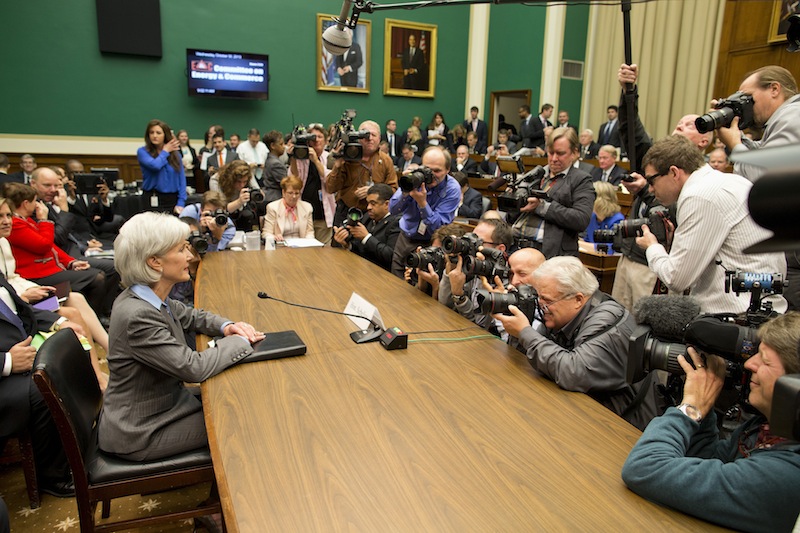It’s not just a hobbled website. Several things came together in October to seriously challenge and perhaps truly damage the roll out and perhaps even the future of Obamacare. The hobbled website created a backdrop of dysfunction and incompetence. The mass cancellations (which in many cases weren’t cancelations at all) provided a class of aggrieved victims. The President’s promise – which never really made sense given the nature of the program – tied it to the chief executive, with a moral, broken promise edge. Republicans have been trying to dismantle Obamacare for literally years. And they’re doing everything they can to fan the flames. But over the last few days Democrats (and not just Democrats from Red States) have been coming forward to support ‘fixes’ which would either seriously complicate the launch the Affordable Care Act or even kill it in its infancy. For Democrats and especially the President (who can kill any fix with his pen), it’s time for the big gut check, one that’s not only about 2014 but stretches back into the 1940s and has implications probably decades into the future.
There is a simple reality behind the current crisis (and I think it’s fair to call it a political crisis for Obamacare): getting people out of junk or non-coverage policies and into real coverage is a feature, not a bug. Because of its intimate connection to life and death, quality of life and the simple fact that as a society we’re not willing to simply let people die of their ailments if they can’t afford care, private health insurance has always been a playground of market failure. It’s only become worse as medical technology and costs have grown.
The simple fact is that you can’t ever have a workable system as long as the young and healthy are opted out and the sick and old are in the system. Everybody has to pay in at some relatively comparable level if everyone is going to be able to get permanent insurance at some sort of reasonable rate. That’s why some people are being ‘forced’ to upgrade to ACA compliant policies.
It’s generally understood that people who simply don’t carry any insurance, if they have the financial means to buy it, are basically free-riders on the rest of the system, on everyone else. A central premise behind Romneycare and Obamacare is that people who have junk policies with little or no actual coverage are basically doing the same thing.
There are a range of ‘fix’ plans circulating through Congress right now. House Democrats are apparently signaling to the White House that they need one to get behind by the end of the week or members will start getting behind the Republican alternative which basically guts Obamacare.
As I said, there are a host of plans. I don’t know the details well enough to know which are impediments and which are poison pills. But I know enough to know that the basic logic above amounts to an iron law. If you don’t get everyone into the system with at least a base level solid policy there just isn’t enough money to cover the sick and the ‘bad risks’ of people with pre-existing conditions.
So as I said, it’s a gut check moment for Democrats. One factual and political point that is getting very little attention is just how many people are affected – people losing policies who will need to pay substantially more without subsidies. This is a critical point and I’ve seen virtually no reliable data. It’s all been a political fog. It is clearly a very, very small part of the population and there is abundant evidence that vastly more people are or soon will have reduced premiums or be able to get insurance that they couldn’t get before. The ‘winners’ greatly outnumber the losers. And this does not even get to the point that everyone is a ‘winner’ because of the end of life time limits, restrictions on pre-existing conditions (which we’ll all eventually have) and more. This is why the initial failure of the website was such a blow: it hid or delayed all the upside of the law (the ‘winners’ of the law) and has left all the focus on people who will – really must – pay more.
But back to that gut check. Allowing to the people with little or no care to stay out of the system makes about as much sense as two people in a canoe on rough water deciding that maybe it will get better if you both stand up. Market failure in the transition to a new system like this can come really hard and fast if you pull the legs out of under it. It took almost 20 years to revisit Health Care after the 1994 debacle. You can only imagine how long it would be if Dems run for the hills now.
So take some hits and let this work its way through or run for the hills and maybe discredit any plan to ensure coverage for all for decades to come. I suspect that the number of people in the victim category is being blown wildly out of proportion and inflated by a policy challenged press. And if the exchange mechanism can be improved soon, I doubt the political repercussions will be great. Actually, the reverse. This is mainly a crisis of confidence. But it can spill over into a genuine policy crisis. So Democrats need to make a choice. And the President does too. It may not be an easy one if they can’t get the exchanges in motion rapidly and get the ‘plus’ sides in motion and visible. But this is the moment when we’re going to see what the decision is. And I suspect some stiffening of spines will have to come from the president.






